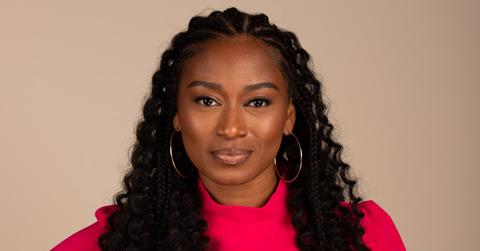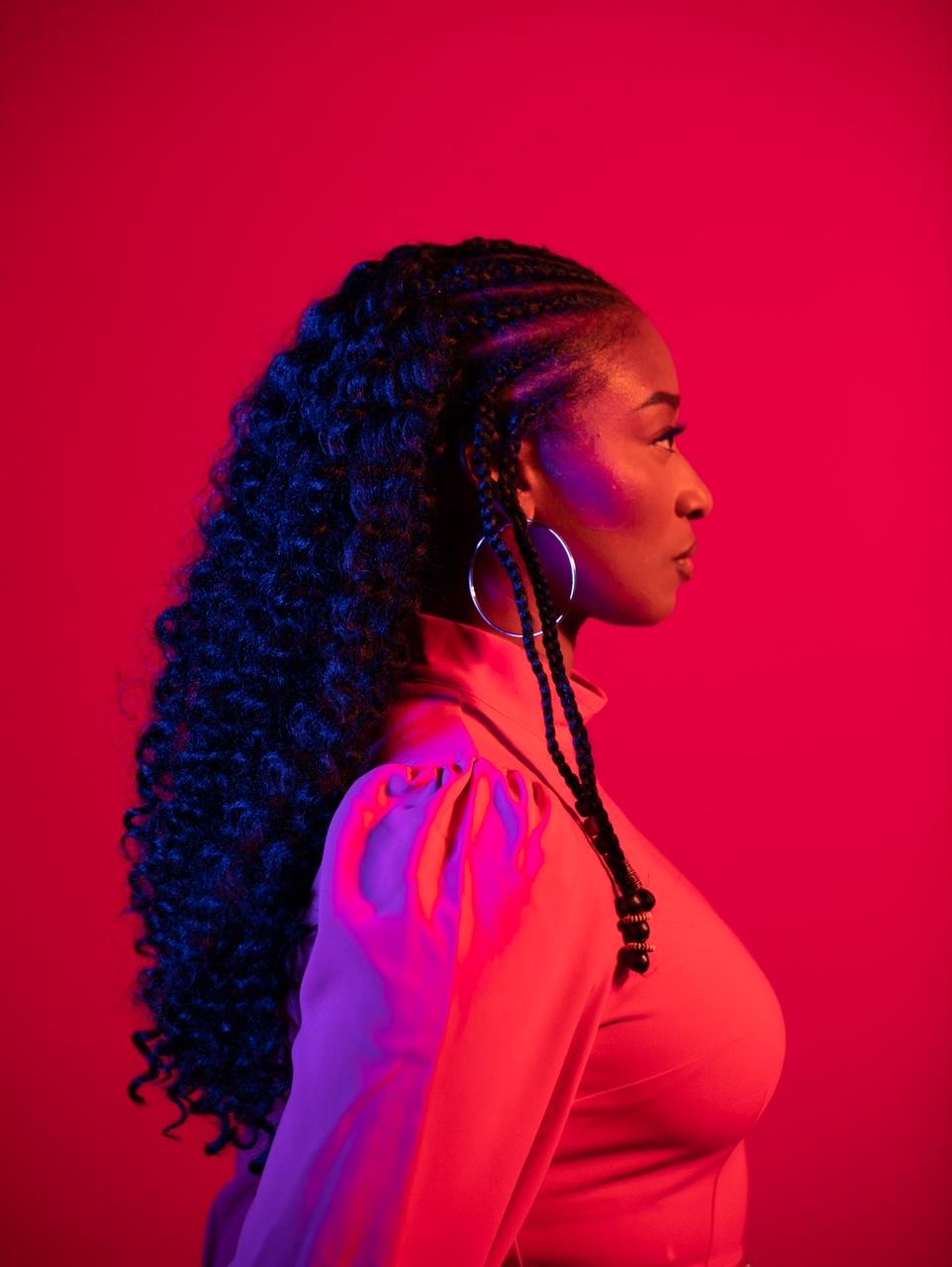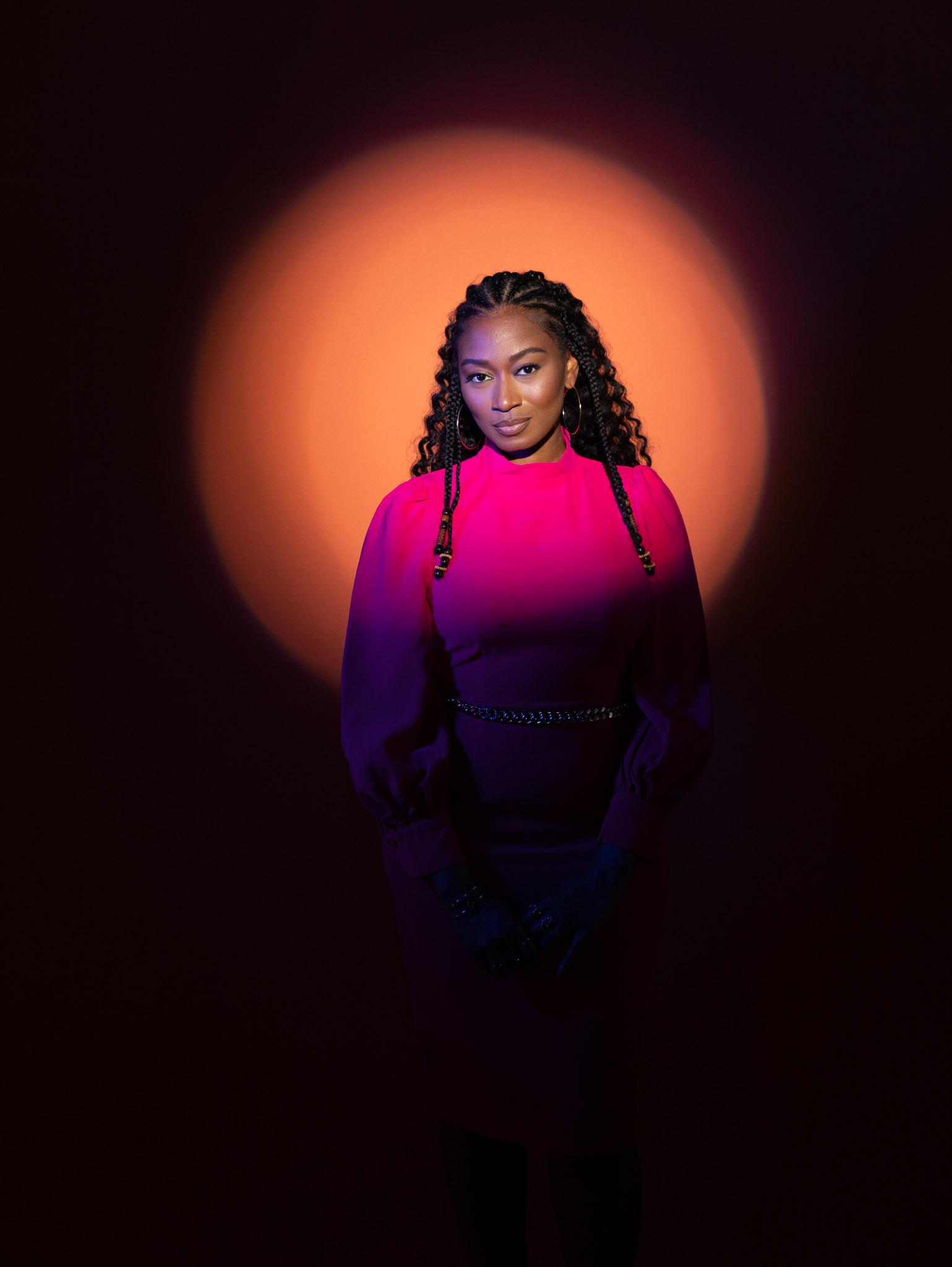
Young, Unskrypted and Black
Folasadé Ogunmokun Tells How — and Why — She’s Transforming Media Head-On
By Kent OldenSept. 3 2024, Published 4:03 p.m. ET

Some of Black culture’s most iconic moments from TV and film are the ones that were never in the script in the first place. From the impromptu Lion King-like musical performance by Queen Latifah, Kim Coles, and Erika Alexander after Kim Fields enters a scene on Living Single wearing a dashiki, to Leon’s unforgettable, “Ain’t nobody comin’na see you, Otis!!!,” as the very-much-hated David Ruffin in The Temptations, to the legendary, “BABY, PLEASE! PLEASE!,” that was accidentally shouted out by Kadeem Hardison in the wedding episode of A Different World (because he actually forgot his lines), Black artists and creatives have always displayed the sharp minds and quick wit that have become a part of who we are. We never know where our lives – or our lines – are going to take us, so we’re always ready for whatever may come. It’s that unique unscriptedness that takes us to higher heights, creating a name for ourselves simply because we decided – in the moment – to go against the grain. Out of that same spirit, Unskrypted TV was born.
We had a chance to sit down with Folasadé Ogunmokun, founder and CEO of Unskrypted TV, to talk about her passion for sharing Black stories and why we should never be ashamed to tell them.
BLEU MAGAZINE: “Let’s start with where the idea for Unskrypted Network came from. What was the exact ah-ha moment that let you know this is what you needed to do?”
FOLASADÉ OGUNMOKUN: “This is such a fun question because it’s really kinda problematic, you know? [laughs] I used to work at a news station and, at this news station, there were multiple instances that happened that made me feel like I was not in the right space. I decided that if I stayed there I was gonna go insane because I felt like I was in an uncomfortable space, or I was going to end up changing into what they were pretty much telling me I had to be, and I didn’t want either of those things. So, the exact moment was when the verdict came out about Trayvon Martin’s murder. When it comes to news, you have to run the story over and over and over again and, when I was in that space, sometimes people behind the scenes would say things. These are the things that don’t make it to air, and it bothered me to such an extreme point. I was a brand new mom — my son is 12 now. I had just graduated from Howard University and I told myself that I had a specific role in this world to not only show up as a strong Black woman, but also a strong Black mother, and I wasn’t going to be able to do it staying in that space. I actually went to campus with my own camera and did my own package. My package and the coverage being aired on TV were completely different. That’s when I said, ‘We need our own place.’”
BLEU: “Where you left off goes right into the next question: How does your HBCU experience, combined with your Nigerian heritage, play a part in the work that you’re doing now?”
FOLASADÉ: “I love that question. So, I grew up pretty much American. I have a Nigerian name, I know parts of my father’s history and sometimes I would eat the traditional foods, but I was an American child who just got bullied for having an African name, okay! >laughs< So going to Howard, I knew I was going to be around amazing Black people, but that was really my introduction to Nigerians and other people of the Diaspora. One person in particular — shout out to Jumie — she really brought me into her family where I was able to learn so much about myself. I was actually able to learn more about my heritage and my Blackness from going to Howard, which made me understand that I have a dual placement that really does matter. I am American. I was born here, my mom is from here. There is a lot of our history that is rooted here despite the fact that my dad is from Africa, but then I am also African, and that is something that I was completely disconnected from. When it comes to finding that out and being brought into that, I felt like there was a bigger need in the Diaspora for us to be connected. We’re disjointed in our community just in America, but then understanding we’re disjointed in the global community — it was like an awakening! Like, ‘You know what, we got roots all over. We need to start connecting some branches!’”

BLEU: “So you refer to yourself as an innovative disruptor – which we love! What does that mean for you, but also, what do you want your audience to take from that?”
FOLASADÉ: “Ooo…OOOOOO! Now we’re getting into it! This might be the first time I’ve ever answered that! So, to me, an innovative disruptor is somebody who learns and adapts from their environment — pretty much learns all the rules — and then finds a way to break them. So, that’s me. I’ve learned a lot of rules, I’ve seen a lot of boundaries and understood the placement of where I’m ‘supposed to be’ and decided, ‘That’s cool, but this is what we’re supposed to do. This is where we’re supposed to be.’ And it’s hard being an innovative disruptor. It’s extremely hard to go against the grain, but there’s a small switch that goes off in people’s brains once they actually start doing this disrupting, and it makes everybody else go, ‘Dang! Why didn’t I think of that?,’ or, ‘We need to be doing that!’ It’s a hard journey, but — oh my God — it’s rewarding once you see people get it.”
BLEU: “Thank you for that! So you’re in the second season of Founding in Color on Peacock and you’re launching the first season of The Bag. What message do you want viewers to take away from each show?”
FOLASADÉ: “Well, Founding in Color is such an amazing show because it doesn’t sugarcoat the experience of these founders and it puts us in a spotlight where we’re able to be authentic but be out there with it. What I want people to take away from that show is seeing the journey. Life ain’t no crystal stair, you know? Life isn’t easy, but there’s always gonna be something there that reminds you to own your moments: own your good, own your bad, own your growth, and be able to get to the next phase. That show really helps you see the different levels of that journey, whether you’re a newbie like me or an established entrepreneur. A lot of times we see people as an overnight success once they’ve made it, and I don’t think that that’s fair. This show really lets you see the journey and I appreciate the whole message of ‘You can do it too.’ With The Bag, I think it’s important that Black people understand how much spending power we have. We spend a lot of money; however, we don’t have a lot of money, and when it comes to the Black Dollar, it doesn’t get circulated in our community as much as it should. The Bag is saying not only can we get to the bag and watch a show that displays that, but also that we are the culture and we are the ones who create the means behind what we’re supposed to be behind. I love all the products on the show, and if they were on bigger platforms, they would be outta here! People would be buying them up! What I want people to take away from the show is we support our own. If you have a super amazing business or brand or story to tell, we want you on our show. Whether it’s the diaper bag, the gym bag or whatever bag you see yourself in, we invite you to come be a part of the show. The only way we’re gonna know what you have is for you to come be with us — the content creators, the businesses, the viewers — and talk about it.”
Founding in Color and The Bag can be streamed on Peacock. For more information on Folasadé and Unskrypted TV, visit folasadeo.com and unskryptedtv.com. Don’t forget to follow on social media @unskryptedtv.

